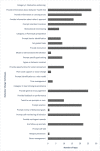Smartphone applications available to pregnant women in the United Kingdom: An assessment of nutritional information
- PMID: 31833237
- PMCID: PMC7083499
- DOI: 10.1111/mcn.12918
Smartphone applications available to pregnant women in the United Kingdom: An assessment of nutritional information
Abstract
The importance of diet during pregnancy is critically important for the short- and long-term health of both mother and child. The number of apps targeting pregnant women is rapidly increasing, yet the nutritional content of these tools remains largely unexplored. This review aimed to evaluate the coverage and content of nutrition information in smartphone apps available to U.K. pregnant women. Keyword searches were conducted in iTunes and Google Play stores in November 2018. Candidate apps were included if they targeted pregnant women, provided pregnancy-specific nutritional information, had a user rating of at least 4+ based on at least 20 ratings, and were available in English. Nutritional content was assessed for accuracy against U.K. recommendations. Behaviour change techniques (BCTs) were also evaluated. Twenty-nine apps were included, seven of which originated in the United Kingdom. There was a large variability in the quality of smartphone app nutritional information. The accuracy of nutrition information varied, and several apps conveyed inappropriate information for pregnancy. On average, 10 BCTs were identified per app (range 2-15). Overall, smartphone apps do not consistently provide accurate and useful nutritional information to pregnant women. This study highlights the need for the integration of evidence-based nutritional information during app development and for increased regulatory oversight. App developers should also make it clear that nutritional content is intended for a specific geographical region or population or modify for the intended audience. These are important considerations for the design of future apps, which are increasingly used to complement existing maternity services.
Keywords: accuracy; and nutrition; behaviour change techniques; maternal nutrition; pregnancy; smartphone applications.
© 2019 The Authors. Maternal & Child Nutrition published by John Wiley & Sons, Ltd.
Conflict of interest statement
The authors declare that they have no conflicts of interest.
Figures
References
Publication types
MeSH terms
Grants and funding
LinkOut - more resources
Full Text Sources




